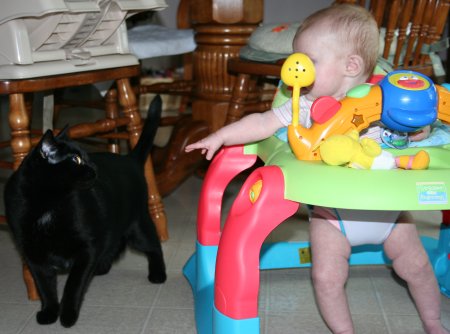What’s this?

This is a picture of Cate’s first “steps” onto the sand at Myrtle Beach!

Cate’s not quite ready to crawl around in the sand. But she does want to roll in it!

What’s this?

This is a picture of Cate’s first “steps” onto the sand at Myrtle Beach!

Cate’s not quite ready to crawl around in the sand. But she does want to roll in it!
I’ve not had much time for local news the past few days, but I notice this morning that Steve Spurrier (head football coach at the University of South Carolina – for those of you who don’t follow South Carolina’s dominant religion) has blasted the flying of the Confederate flag on State House ground.
Spurrier feels that
“No one had ever asked me about my opinion on the flag, but if they had I would have told them it needs to come down. I don’t know anybody that disagrees with me, but obviously there are a lot of South Carolinians that do.”
[…]
The flag issue, according to Spurrier, is an obstacle to the state’s improving its image.
Sounds pretty sensible to this Tiger fan. If you want to convince the rest of the country that South Carolina isn’t a state full of ignorant, bigoted rednecks, a good place to start might be that flag and the racism it has come to symbolize.
I actually learned about Spurrier’s remarks from taking a glance as the letters to the editor page of The State. One letter caught my eye. It said:
Coach Steve Spurrier’s claims that removing the Confederate memorial flag would “make us a more progressive, better state.†This is akin to a coach saying that if the team would change its uniform colors or mascot, the team would score more touchdowns.
[…]
Removing a flag that commemorates history to solve the state’s problems makes as much sense as rearranging the deck chairs on Titanic to save the ship.
In a sense, this letter writer has a point. Removing the flag would do little to ease the burdens of folks living in our poorest counties. It would do little to improve infant mortality, or to better fund our schools.
But I’ve learned something from being an educator all these years. For a student to rise to the challenge of learning something new, he must first realize that his ignorance is not something to be proud of. Once he realizes that, he has a motivation to invest the time and effort necessary to learn something new.
For this state to become a “more progressive, better state”, it has to do the same thing. We have to stop being proud of the ignorant things some of our forefathers did. The flag is just a small step, but it’s an important one.
The letter writer got his metaphor wrong. Removing the flag isn’t rearranging the deck chairs. It’s taking the first, small step towards the lifeboats.
The news yesterday was dominated – as you’d expect – by the Virginia Tech shootings. News sources provided continuous “coverage”. They speculated endlessly about the causes of the shooting and the motivations of the shooter. As I arrived home yesterday, CNN Headline News was running some woman who was convinced that the shooting was caused bythe “degeneration” of American culture and the prevalence of violent video games. Of course, no one yet knew a thing about the shooter except that he may have been “Asian”. Other news outlets were – more or less – doing the same thing.
Now we know that the shooter was a South Korean English major. So much for the whole “degeneration of American culture” argument. But I’m sure there will be equally pointless avenues of speculation available to today’s news shows.
As a college educator, I feel like I ought to say something about the whole affair. A day later, I’m still at a loss as to exactly what I should say. This was a terrible tragedy. More that thirty people were killed. What can I possibly say about that?
Was it preventable? At this point, it’s difficult to say. We don’t know why the shooter did what he did, or if there were any obvious signs that he was about to go on a rampage. And how do we protect students from someone who is determined to take his own life and as many others as he possibly can – while maintaining an environment where students can learn?
Could the school have handled the situation any better? Perhaps, but it’s entirely too easy to armchair-quarterback what the school “should” have done after the events have already happened. About all I can say on that matter is that I’m surprised the administration didn’t cancel classes after the first shooting. But … I work at a small school with no on-campus housing. At my school, canceling classes would have cleared nearly everyone from the campus. That’s not going to be the case at Virginia Tech.
I might have more to say on this later. Right now, I’m still … stunned.
There won’t be very many posts this week, since I currently have very limited internet access. But here’s something I thought I would share with y’all.
Cate has noticed the cats. She has seen the cats for a while now. Up until recently, though, she’s seen the cats as similar to things you’d see on a television screen. The cats were things to watch, but not things to touch and interact with.
Not any more!

Cate and Tom
Cate now reaches for and touches the cats. They are lucky that she hasn’t yet discovered that cats have tails!
Perhaps you’ve heard of South Carolina’s latest attempt to embarass itself? It’s called HR 3355, a bill which would add the following to South Carolina law.
Any woman who wants to have an abortion, for whatever reason would be forced to have and view an ultrasound of the fetus:
The obstetric ultrasound must be performed by the physician who is to perform the abortion or a certified technician working in conjunction with the physician.
The images viewed by the physician or certified technician to verify the gestational age must be reproduced and reviewed with the mother by the physician or allied health professional working in conjunction with the physician prior to the woman giving informed consent to having an abortion procedure performed.
[…]
The woman must certify in writing, before the abortion, that the information and obstetric ultrasound images […] have been provided to and reviewed with her
I discussed this bill with my wife the other day. She thinks it’s a boneheaded bill, and I agree. Why do we think this bill is bad?
We here at Shrimp and Grits are not pleased that our legislators are wasting time with such foolishness.
Take a look at this graph, showing college enrollment (in thousands of students) from the 1970s through 2005.

Source data: US Census Bureau
The red curve is what you probably expected. College enrollment increases fairly steadily with time. (The sharp dip in the late 70s is an artifact of changing the method of counting students).
But there’s a wrinkle. The red curve counts only undergraduates at four-year colleges. The blue curve shows the situation in America’s two-year colleges: community colleges, junior colleges, and technical colleges. Enrollment in our two-year colleges is flat, and has been so since the early 1990s. Before 1990, two-year college enrollment grew along with four-year enrollment.
Is the conventional wisdom that you need at least a bachelor’s degree to get any kind of worthwhile job now so entrenched that nobody thinks to go to a two-year school anymore?
Since I teach at a two-year school, the flat enrollment figures concern me. I worry that students who are perfectly capable of getting a two-year degree and a good job*** are being siphoned off by four-year schools – who then proceed to chew many of them up and spit them out without either a degree or useful job skills.
So, why are two-year college numbers so flat? Your thoughts?
***Who do you think has better job prospects? A new registered nurse with an associate’s degree in nursing, or someone who has just gotten their bachelor of arts in English?
Students love multiple choice questions. I typically have several types of questions on my
chemistry tests. If I tell my students that there will be only, say, fifteen multiple choice questions on the upcoming test, I will almost always have several students frown and ask for more.
Sometimes, I’m tempted to give in and just give a multiple choice test like these students want. After all, multiple choice questions are the easiest kind of test question to grade, and I don’t have any assistants to grade papers for me.*** But I don’t give in. The reason? Because students almost always perform more poorly on multiple choice questions than they do on “harder” question types.
Why?
Some students will tell me that they like multiple choice questions because the right answer is already on the paper, and it’s easier to find the answer in a list than it is to figure the answer out. This might actually be part of the reason that students do so poorly on multiple choice tests: They don’t think that they have to figure anything out, and they expect multiple choice questions to be like this:
These charged particles are normally found inside the nucleus of atoms.
A) birds
B) cheeseburgers
C) oranges
D) orangutans
E) protons
… where the right answer is immediately obvious, even if you don’t know a darned thing about chemistry or the nuclear model of the atom. Instead, they get questions more like this:
These charged particles are normally found inside the nucleus of an atom.
A) borons
B) electrons
C) neutrons
D) photons
E) protons
This is still an easy question, but some students will miss it. These same students are able to draw a picture of and describe the basic details of the nuclear model of the atom in a later (not multiple choice) question on the same test! My conclusion is that the student misses the multiple choice question because he simply doesn’t expect to have to think about it.
I see the same thing with multiple choice questions that involve a calculation. If the same problem is presented as a multiple choice question and as a problem where they have to write their answer in a blank, the students will miss the multiple choice problem more often. They will try to do the multiple choice problem directly on their calculators (despite scratch paper being available), while they will usually write down the steps of the problem where they have to put their own answer in a blank.
In summary, if any students are reading this – don’t ask for more multiple choice questions! They’re not really “easier” than any other kind of question, and they’re more likely to bring your grade down!
***Well, except for this assistant. But you don’t want her grading your paper!